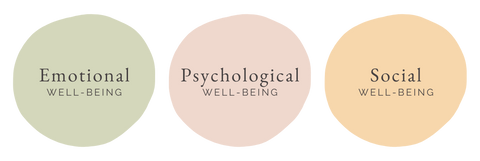
The 3 Main Elements of Mental Health: Understanding Emotional Well-Being, Part 1 of 3
As we continue to celebrate Mental Health Awareness Month, we wanted to take a moment to talk about what mental health is and what it consists of. Let's break it down.

Mental health refers to our emotional, psychological, and social well-being. You can read about the other two elements here: Psychological Well-Being and Social Well-Being.
The First Element of Mental Health: Emotional Well-Being
Emotional well-being is the ability to recognize, express, and manage our emotions in a healthy way. It involves understanding and regulating our feelings, coping with stress, and maintaining a positive outlook on life.
Here are some key components of emotional well-being:

Self-Awareness
Emotional well-being starts with being aware of your emotions, strengths, and limitations. Understanding your emotions can help you develop healthy ways of coping and build healthy relationships with others.
How to work on self-awareness:
- Practice mindfulness meditation to develop your awareness of your thoughts and feelings.
- Journal your thoughts and emotions to identify patterns and gain insights about yourself.
- Take personality tests or assessments to gain a better understanding of your strengths and weaknesses.
Emotional Regulation
The ability to manage your emotions is also an essential aspect of emotional well-being. Self-regulation involves identifying your emotional triggers and developing healthy ways of responding to them. It can help you avoid impulsive behavior, reduce stress, and improve your overall well-being.
How to improve your emotional regulation:
- Learn relaxation techniques like deep breathing, progressive muscle relaxation, or yoga to help calm your mind and body.
- Practice expressing your emotions in healthy ways, such as talking to a trusted friend or family member or writing in a journal.
- Seek out professional help from a therapist or counselor to learn more effective ways of managing your emotions.
Positive Outlook
A positive outlook on life can help improve emotional well-being. This involves having a sense of purpose, optimism, and resilience in the face of adversity. It can help you see challenges as opportunities and maintain a more balanced emotional state.
How to gain a more positive outlook:
- Develop a gratitude practice by regularly reflecting on what you're thankful for in your life.
- Set meaningful goals that align with your values and give you a sense of purpose.
- Surround yourself with positive people who uplift and support you.
Self-Care
Practicing self-care activities like exercise, meditation, or getting enough sleep can help us manage stress and build resilience. Self-care can also help you improve your emotional well-being by providing an outlet for your emotions and reducing stress.
How to make yourself a priority:
- Prioritize getting enough sleep by establishing a regular sleep routine and creating a sleep-friendly environment.
- Engage in physical activity that you enjoy, such as going for a walk, bike ride, or doing yoga.
- Eat a balanced and nutritious diet to fuel your body and mind.
Self-Compassion
Treating yourself with kindness, empathy, and understanding is another essential aspect of emotional well-being. Self-compassion can help you feel more positive emotions and reduce negative ones, leading to a more balanced emotional state.
How to treat yourself with more self-compassion:
- Practice self-compassion by speaking to yourself with kindness and empathy, just as you would to a good friend.
- Take breaks and allow yourself to rest when needed, without judgment or guilt.
- Seek support from others when you need it, whether it's from friends, family, or a professional.
Mental Health Resources for Emotional Well-Being
Self-care is such an important aspect of emotional well-being, but a lot of us don't know how to create self-care routines effectively. Learn how to make yourself a priority in this curated collection from our team of Aspyn Coaches. Download the Aspyn Coaching app now and let us guide you towards a better you.
Start a 7-Day Free Trial & Watch Now >
Join our team of Aspyn Coaches in these sessions so you can start to identify your anxiety triggers, use techniques to manage it, and build an anxiety management toolkit. Download the Aspyn Coaching app now.
Start a 7-Day Free Trial & Watch Now >
Learn how to manage your stress, eliminate overthinking, and find your direction in this curated collection of stress management sessions from our team of Aspyn Coaches. Download the Aspyn Coaching app now to get started.
Explore Other Aspyn Market Products

ASPYN COACHING

ASPYN PLANNER & WELLNESS WORKBOOK




